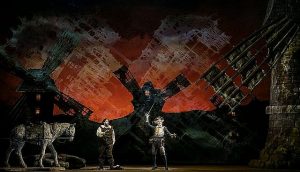RECOMMENDED
At a time when opposing philosophies are ridiculed, the Lyric Opera of Chicago steps in with a reminder there must be room in the world for idealists and dreamers.
Jules Massenet’s ‘Don Quichotte,’ based on Cervante’s ‘Don Quichotte’ (Don Quixote) and influenced by Jacques Le Lorrain’s play, ‘Le chevalier de la longue figure,’ is both love story and tale of a knight-errant who seeks chivalrous adventures to right the world’s wrongs.

The Lyric production lets audiences know that the opera’s story unfolds from Cervante’s large tome with the use of a young boy who sits and turns pages amid crowds and main figures. Chapters in the book are reflected on the curtain between each of the opera’s five short acts (running time 2. 5 hours with intermission).
Italian bass Ferruccio Furlanetto’s superb voice and acting skills make him an ideal Don Quichotte. His words are made even more believable against Ralph Funicello’s gorgeous sets ranging from a small Spanish village to a countryside filled with dangerous windmills.
French mezzo-soprano Clementine Margaine is delightful as the Dulcinée who mostly likes being the center of admirers’ attention. But she really reaches the audience near the end of Act IV when she sings “Qui, je souffre votre tristesse (‘I share your sorrow). and tells him her life is different from his and she is not worthy of his love.
Italian baritone Nicola Alaimo has produced a fine comedic Sancho Panza. His best aria is at the end of Act IV after Dolcinée leaves and some villagers return to make fun of Quichotte. Sancho sings “Riez, allez, riez du pauvre ideologue” (Laugh, go on laugh at this poor idealist’). He then exits with Quichotte.
The act ends with enthusiastic applause for the glorious singing of Margaine, Furtanetto and Alaimo. Forgetting that the opera has five acts, many in the audience thought Quichotte and Sancho’s exit was an appropriate climax. However, the opera is comédie-héroïque so Act V offers thoughts on heroism and dreams as Quichotte dies.
On a cheerier note, what the audience might want to take away with them is how Quichotte explains himself to the bandits he deliberately set out to meet. He wanted to retrieve Dolcinée’s pearl necklace from them.
He sings “Je suis le chevalier errant… et qui redresse
Les torts; un vagabond inondé de tendresse, Pour les mères en deuil, les gueux, les opprimés, Pour tous ceux qui du sort ne furent pas aimés” (I am the knight-errant… and who rights wrongs; a vagrant of a great affection for the mourning mothers, beggars, the oppressed, for all those who were not of the beloved sort).
An interesting operatic note is the choral blend of soprano and tenor voices provided by Dulcinée’s lovers. Massenet wrote the opera for her lovers to be two travesti singers (a theater term asking that members of the opposite sex play the role). Two of her four lovers are sopranos and two are tenors.
Diana Newman who was Woglinde in Das Rheingold is Pedro. Lindsay Metzger who was Alisa in Lucia di Lammermoor is Garcias. Alec Carlson, the animal tamer in Der Rosenkavalier is Juan and Jonathan Johnson, Hylas in Les Troyens, is Rodriguez. Their voices mix beautifully with Dulcinée’s.
Conducted by Sir Andrew Davis and directed by Matthew Ozawa, Lyric’s ‘Don Quichotte,’ might have audiences leaving the opera house talking about idealism.
Details: ‘Don Quichotte’ is at the Lyric Opera of Chicago, Civic Opera Building, 20 N. Upper Wacker Dr, Chicago, IL 60606 now through Dec. 7, 2016. For tickets and other information call (312) 827-5600 and visit Lyric.
